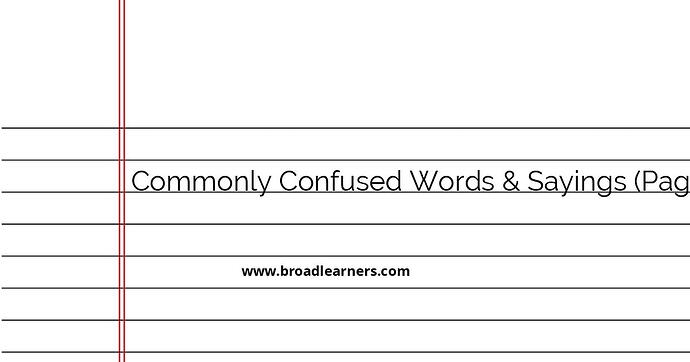Understanding and correctly using commonly confused words and sayings can significantly enhance your communication skills. Misusing such terms can sometimes lead to misunderstandings. In this guide, we'll explore some commonly confused words and sayings to help you use them correctly and effectively:
- 1. Effect vs. Affect
Effect is typically used as a noun meaning 'a result or an outcome.' For example, 'The effect of the new law was immediate and significant.'
Affect, on the other hand, is commonly used as a verb meaning 'to influence or to make a difference to.' For instance, 'The decision will affect our overall strategy.'
- 2. Compliment vs. Complement
Compliment is a noun or verb implying praise or admiration. An example is 'She gave me a compliment on my cooking.'
Complement is used as a noun or verb to denote something that completes or goes well with something. For example, 'The wine perfectly complements the dinner.'
- 3. Stationary vs. Stationery
Stationary is an adjective meaning 'not moving or not intended to be moved.' For instance, 'The car remained stationary for a long time.'
Stationery refers to writing materials and office supplies. An example is 'She bought new stationery for the school year.'
- 4. Principle vs. Principal
Principle is a noun that stands for a fundamental truth or a rule. For instance, 'Honesty is a key principle in scientific research.'
Principal can be used as a noun or adjective. As a noun, it refers to the head of an institution or an important figure, e.g., 'The principal gave a speech during the orientation.' As an adjective, it means 'main' or 'most important,' e.g., 'The principal reason for his absence is still unknown.'
- 5. Accept vs. Except
Accept is a verb meaning 'to receive' or 'to consent to receive.' For example, 'She accepted the award happily.'
Except is primarily a preposition meaning 'not including,' e.g., 'Everyone is invited to the meeting except John.'
Understanding the correct usage of these terms ensures that your communication is clear and precise. Let's delve into detailed examples for each pair:
1. Effect vs. Affect
Example of Effect:
The new education policy had a profound effect on students' engagement levels.
Example of Affect:
The weather significantly affected our travel plans, causing delays and cancellations.
2. Compliment vs. Complement
Example of Compliment:
Jane received a heartfelt compliment from her boss for her outstanding presentation.
Example of Complement:
The new curtains complement the room's decor, enhancing its elegance.
3. Stationary vs. Stationery
Example of Stationary:
Despite the heavy winds, the statue remained stationary at the park entrance.
Example of Stationery:
My grandmother sent me a letter on beautiful floral stationery.
4. Principle vs. Principal
Example of Principle:
The principle of fairness underpins many of our democratic institutions.
Example of Principal:
Mrs. Howard, the principal of the school, welcomed the new students warmly.
5. Accept vs. Except
Example of Accept:
She accepted the job offer after careful consideration.
Example of Except:
All family members except Uncle George attended the reunion.
By distinguishing these terms correctly, you can prevent common communication errors and enhance clarity in your writing and speaking.
Did I miss anything? Respond below
